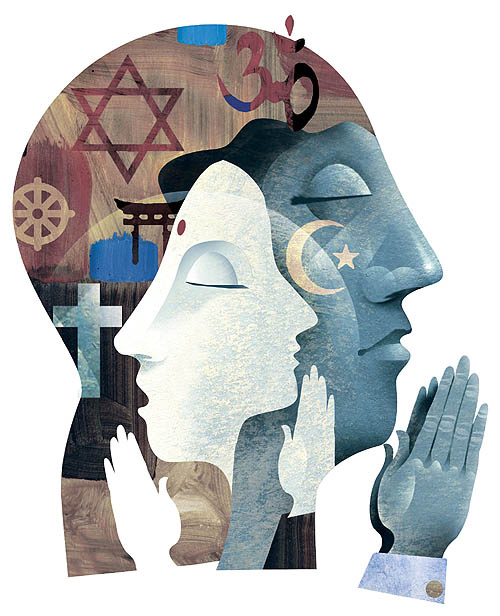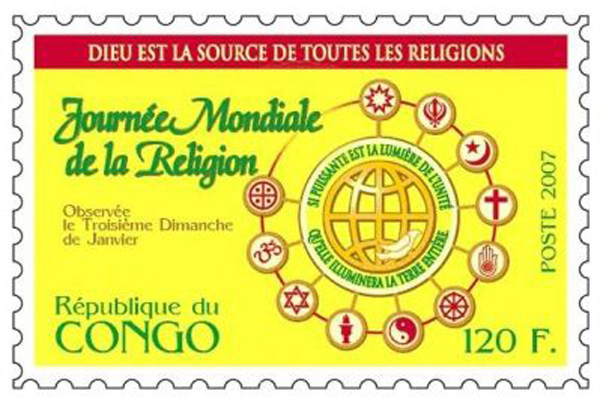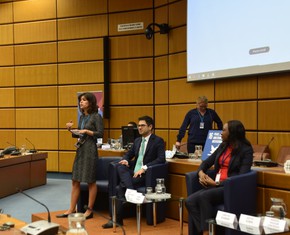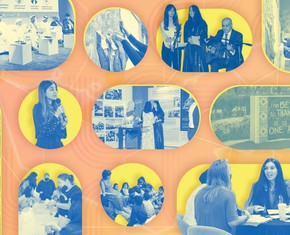The views expressed in our content reflect individual perspectives and do not represent the authoritative views of the Baha'i Faith.
World Religion Day, originally a Baha’i-inspired interfaith idea observed worldwide on the third Sunday of January each year, has taken on a life of its own.
 In 2009, for instance, the Halifax (Nova Scotia) Regional Municipality in Canada celebrated its sixth annual World Religion Day in the Cathedral of All Saints, in recognition of which the mayor and councilors of the Halifax Regional Municipality issued a proclamation. In 2007, at the World Religion Day event hosted by the Entebbe Municipal Council of Entebbe, Uganda (situated on the northern shores of Lake Victoria), participating religious leaders signed a joint declaration to establish the Entebbe Inter-Faith Coalition. The signatories pledged to use “the unifying power of religion to instill in the hearts and minds of all people of faith the fundamental facts and spiritual standards that have been laid down by our Creator to bring them together as members of one family.”
In 2009, for instance, the Halifax (Nova Scotia) Regional Municipality in Canada celebrated its sixth annual World Religion Day in the Cathedral of All Saints, in recognition of which the mayor and councilors of the Halifax Regional Municipality issued a proclamation. In 2007, at the World Religion Day event hosted by the Entebbe Municipal Council of Entebbe, Uganda (situated on the northern shores of Lake Victoria), participating religious leaders signed a joint declaration to establish the Entebbe Inter-Faith Coalition. The signatories pledged to use “the unifying power of religion to instill in the hearts and minds of all people of faith the fundamental facts and spiritual standards that have been laid down by our Creator to bring them together as members of one family.”
World Religion Day, now observed internationally and inter-religiously, originated among American Baha’is. Its history dates back to 1949, when the National Spiritual Assembly of the Baha’is of the United States (the national Baha’i governing council) instituted an annual World Religion Day “to be observed publicly by the Baha’i Communities wherever possible throughout the United States.” The third Sunday of January each year was designated for this celebration, and the first World Religion Day event took place on January 15, 1950.
The Baha’i Faith emphasizes unity in the human community, and the inauguration of World Religion Day seemed a natural expression and extension of the Baha’i focus on the unity of religions, races, and nations. It also served to highlight the advent of a true world religion—the Baha’i Faith itself—as it emerged from obscurity and became a globally-recognized cause.
On April 2002, the Universal House of Justice issued a letter “To the World’s Religious Leaders,” which highly regards all interfaith dialogue. However, the letter states that the initiatives of the interfaith movement of the previous century “lack both intellectual coherence and spiritual commitment.” For its part, “the Baha’i community has been a vigorous promoter of interfaith activities from the time of their inception” and will continue to assist, valuing the “cherished associations” that these activities create. It continued:
We owe it to our partners in this common effort, however, to state clearly our conviction that interfaith discourse, if it is to contribute meaningfully to healing the ills that afflict a desperate humanity, must now address honestly . . . the implications of the over-arching truth . . . that God is one and that, beyond all diversity of cultural expression and human interpretation, religion is likewise one.
While neither the Universal House of Justice nor the National Spiritual Assembly of the Baha’is of the United States currently plays an active role in promoting World Religion Day events, the Baha’i International Community (an official organ of the Universal House of Justice) has consistently reported on such events, with obvious appreciation. In the United States, the timing of World Religion Day now conflicts with Martin Luther King, Jr., Day (the third Monday in January), observed for the first time on January 20, 1986. While this calendar conflict has led to the discontinuance of World Religion Day in many locales, some Baha’i communities integrate the two days, while others may hold their World Religion Day events a few days earlier.

Congolese stamp for World Religion Day
World Religion Day continues to spread, however. On January 20, 2007, in Brazzaville, the Congo Republic became the second country to issue a postage stamp for World Religion Day. Featuring a globe surrounded by the symbols of 11 religions, the stamp bears a French superscription which, translated, reads: “God is the source of all religions.” Following a World Religion Day program that drew more than 250 participants from eight faith-communities, agents were present to sell both the stamps and first-day covers. In 1985, Sri Lanka had become the first country to issue a World Religion Day stamp.
The purpose of World Religion Day today is to highlight the essential harmony of the world’s religions, to foster their affinity through interfaith ecumenism, and to promote the idea and ideal of world unity in which the world’s religions can play a potentially significant role. The day is often celebrated with interfaith dialogue, conferences, and other events that advance not only mutual understanding (or what scholars call “spiritual literacy”), but recognition, respect, and reciprocity among the followers of all religions.
While World Religion Day events are still sponsored and cosponsored by local members of the Baha’i Faith worldwide, an increasing number of World Religion Day events are independently organized by interfaith or multi-faith coalitions. For instance, in Tralee, Ireland, the local World Religion Day observance was organized by the Kerry Diocesan Justice, Peace and Creation Committee, a member organization of Pax Christi International in Ireland. In 2009, the third annual observance of World Religion Day in Greensboro, North Carolina, was organized by FaithAction and the Piedmont Interfaith Council. Also in 2009, World Religion Day was celebrated by Vadamalayan Hospitals and Vadamalayan Institute of Paramedical Sciences, in which a quiz competition was held to mark the occasion.
In certain cases, civic governments, both national and local, have recognized the positive social value of World Religion Day events. In 2004, the House of Representatives of the General Assembly of the Commonwealth of Kentucky proclaimed January 17–18, 2004, as “World Religion Weekend” and went on to “urge the Commonwealth’s citizens to participate in the observance of World Religion Weekend.” In 2007, the Republic of Ghana’s Ghana@50 Secretariat organized a symposium themed “The Unity of the Faiths” on World Religion Day on Sunday, February 18, 2007. In January 2008, the City Council of Duncan, British Columbia, Canada, proclaimed January 20, 2008, as World Religion Day. In a 2009 World Religion Day event in Australia, the parliamentary secretary for multicultural affairs and settlement services, Laurie Ferguson, said: “Interfaith dialogue plays an important role in increasing understanding of our nation’s religious and cultural diversity and bringing Australians closer together. The Australian Government supports interfaith dialogue at the highest levels.” Many World Religion Day events are associated with mayoral or municipal proclamations.
An inspired idea with widespread appeal, World Religion Day has now become self-perpetuating, thanks to the initiatives of progressive individuals and institutions who share a vision of religious unity and confraternity.
This article is adapted from “World Religion Day (January).” Religious Celebrations: An Encyclopedia of Holidays, Festivals, Solemn Observances, and Spiritual Commemorations. By J. Gordon Melton, with James A. Beverley, Christopher Buck, and Constance A. Jones (Santa Barbara, CA: ABC-CLIO, 2011). Vol. 2, pp. 936–939.
You May Also Like
Comments

















It's all about "a celebration of the need for and the coming of a world religion for mankind, the Bahá'í Faith itself." And:
"...the Day was not meant primarily to provide a platform for all religions and their emergent ecumenical ideas. In practice, there is no harm in the Bahá'í communities' inviting the persons of other religions to share their platforms on this Day, providing the universality of the Bahá'í ...Faith as the fulfillment of the hopes of mankind for a universal religion are clearly brought forth."
See 'Lights of Guidance' # 1710